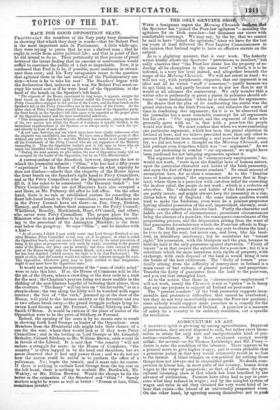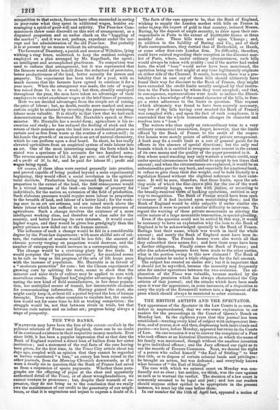AGRICULTURE AN ART.
A •HoPEPur. spirit is growing up among agriculturists. Deprived of protection, they are not disposed to sulk, but rather exert them- selves to attain the only sure and unobjectionable kind of pro- tection—excellence. Nor is their awakened energy merely selfish ; for several—as Sir Thomas Lethbridge and Mr. Pusey- desire to raise the condition of the labourer. There appears to be a general move to give higher wages; and it seems probable that a generous policy in that way would ultimately result in no loss to the farmer. A blind reliance on competition for settling these things does not always end in unqualified profit. No doubt, com- petition in labour has, in most parts of the country, beaten down wages to the verge of pauperism ; so that, of all classes, the agri- cultural labouring class is that which has least benefited by the advance of civilization. Farmers have often had to pay in poor- rates what they refused in wages ; and by the mingled system of wages and rates in aid they obtained the very worst kind of la- bour that exists—the labour of an universally pauperized class. On the other hand, by agreeing among themselves not to push
competition to that extent, farmers have often succeeded in saving in poor-rates what they spent in additional wages, besides en- couraging a spirit of good-will and activity. The Poor-law Com- missioners threw some discredit on this sort of arrangement, as a disguised pauperism and an undue check on the "haggling of the market"; and it was not, perhaps, expedient under the cor- rupt and lax administration of the old Poor-law. But probably it as at present by no means without its advantages. • The farmers of Dauntsey, a parish and manor of Wiltshire, lying withing a ring fence, undertook to keep the resident cottagers employed on a plan arranged by Mr. Engelbach, the agent ; an intelligent and accomplished gentleman. No compulsion was used to enforce that arrangement, but it was represented that the firmer; would derive benefit from the reduction of poor-rates, better productiveness of the land, better security for person and property. The experiment has been tried for a year, with so much success that the farmers have agreed to continue it for a year more. When the arrangment was made, the rate of wages was raised from 7s. to 88. a week ; but then, steadily employed throughout the year, the men have taken no advantage of their employers to extort exorbitant wages at the brief times of pressure. Here we see decided advantages from the simple act of raising the price of labour; but, no doubt, results more marked and more certain might be attained by inverting the process—by rendering labour more valuable. It is chiefly in that view that we hail such demonstrations as the Reverend Mr. Huxtable's speech at Stur- nainster. Mr. Huxtable has a model-farm; agriculture is his re- creation and study ; he has reduced the feeding of stock and the return of their manure upon the land into a mechanical process as certain and as free from waste as the routine of a cotton-mill ; in his hands the growth of an esculent is an act of natural chemistry, which he can perform upon a deal board. In short, he has really elevated agriculture from an empirical system of rude labour into an art. One of the most interesting among the facts which he stated was a specimen of his accounts for two hundred acres. The returns amounted to 15/. Ss. Od. per acre : out of that he reap- ed a profit of 3/. Is. M., and he paid for labour 31.; profit and wages being equal.
Of course, if these ideas 'were carried generally into practice, and proved capable of being pushed beyond a mere experimental beginning, they would effect a social revolution in the agricul- tural districts. Production being increased beyond its present proportion to the extent of the land, the first consequence would be a virtual increase of the land—an increase of property for individuals, for the nation an extension of the Add of production. Such elaborate processes would require more labour in proportion to the breadth of land, and labour of a better kind ; for the work- ing men in an art are artisans, and are raised much above the brute labour which has sufficed to execute the rude processes of agriculture. Such a change involves the existence of a more intelligent working class, and therefore of a class safer for the country, and better knowing its own interests. It would exact higher wages, and they would be given less grudgingly than the paltry pittance now doled out to the human animal.
The influence of such a change would be felt in a considerable degree by the Poor-law department : with more skilful arts of cul- ture, the variation of seasons would be less felt; the amount of chronic poverty verging on pauperism would decrease, and the number of rate-payers would increase in a corresponding ratio.
The change would be a crowning glory for free trade. It would postpone the "population question' 4; for mankind seems to be safe so long as the progress of the arts of life keeps pace with the increase of population. Mr. Huxtable is in favour of a "moderate protection" for corn : but the Cheam experiment of growing corn by splitting the roots, seems to show that the =miter and nicer style of culture may be applied to corn with marvellous results. England has: singular advantages for origi- nating the new kind of field manufactures, in her dense popula- tion, her multiplied means of transit, her innumerable channels for communicating information. Having gained the start, she might easily keep it, at least till a period beyond the ken of human foresight. Even were other countries to emulate her, the emula- tion would not for some time be felt as trading competition : the struggle would be, not that between rivals in trade, but that between rude nature and an infant art; progress being always a stage of prosperity.



























 Previous page
Previous page